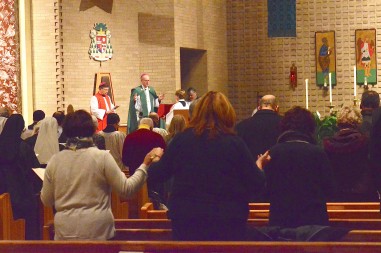January 20, 2015 // Local
Catholic and Episcopal bishops lead prayers for Christian unity

Bishop Kevin C. Rhoades leads the Our Father during the Vespers service at St. Matthew Cathedral in South Bend on Jan. 18. The service marked the opening of the Week of Prayer for Christian Unity. Bishop Edward S. Little II, bishop of the Episcopal Diocese of Northern Indiana, was the homilist and is shown at left.
By Christopher Lushis
SOUTH BEND — On the evening of Jan. 18 at St. Matthew Cathedral, Bishop Kevin C. Rhoades of the Diocese of Fort Wayne-South Bend and Episcopal Bishop Edward S. Little of the Diocese of Northern Indiana joined together in common fellowship for an ecumenical prayer service to initiate the Week of Prayer for Christian Unity.
Bishop Rhoades served as the main celebrant for the Vespers, asking that “the Lord bless us and the Church, that we may be united in our Baptism as brothers and sisters in Christ.” He acknowledged that true unity is only possible through the work of God. “By our own efforts, our own works, we cannot achieve peace. It is only through the gifts of the Holy Spirit that this will be possible; that is why we are here this evening.”
Throughout the service, cantor Alicia Nagy from St. Matthew Parish led Psalms and hymns of praise, in the hope of unity. A combined choir from St. Matthew and the Episcopal Cathedral Church of St. James accompanied Nagy.
Bishop Little offered the sermon for the event, first acknowledging both his gratitude to Bishop Rhoades and the Diocese of Fort Wayne-South Bend for their hospitality and graciousness.
He exclaimed that “acknowledging this friendship provides a sound foundation to remind us that we come together in prayer so that the Lord will make us one. It also signifies that we have unfinished business, specifically to welcome one another as Christ has welcomed each of us — and to do so for the greater glory of God.”
His sermon focused on words from the Anglican Book of Common Prayer, written in 1714, a time where divisions between Puritans, Anglicans and Catholics were felt very deeply. This prayer invoked the name of “Jesus, as our only Savior, the Prince of Peace” to “give us grace, seriously, to weigh to heart the great danger we are in by our unhappy divisions.” Furthermore, it petitions that “as there is one body and one spirit, one hope of our calling, one Lord, one faith, one baptism, one God and Father of us all, so may all be of one heart and one soul, united in one holy bond of truth and peace, of faith and of charity.”
Elaborating on the prayer, he explained that “here we encounter good news, bad news, and really good news.” First, the good news is that “acknowledging Jesus is our only savior, the prince of Peace, is no mere pious sentiment. Whatever else may divide Christians, we are united in our confession of Jesus Christ as the King of Kings and the Lord of Lords. We are united to him and praise his name together.”
He continued, “you and I have more in common with Christians in Africa, Asia, South America, and those in the Middle East living under terrible persecution than we do with non-Christian neighbors who may watch the same television programs and drive the same car. Rather, we are united in our confession of Jesus Christ, and Jesus holds all of us in his heart.”
Next, the bad news. “At the Last Supper, Jesus prays to His Father, asking that all His followers may be one, “even as You and I are one, and that the world may believe that You have sent me.” Here Jesus invites the world outside the Church to make its decision about it on the basis of how we within the Church deal with one another. This is powerful and frightening. We are in danger when we fail to recognize Jesus in one another. And no Christians are exempt from this danger.”
However, there is still very good news. “We are one body, one spirit, one Lord, one baptism, Jesus is our only hope; it is Jesus who binds us together. He is already at work in us supernaturally. The fact that we share one baptism, that we have been plunged into this water in the name of the Father, the Son, and Holy Spirit means that the triune God has claimed us for His own, and that we are supernaturally bonded to Him and one another. Our communion may be imperfect, and we have a long way to go, but it is real nonetheless. We must throw ourselves on God’s mercy and plead with Him to changes our hearts. And so transform us that our unity become visible.”
Afterwards, those in attendance expressed their appreciation and enjoyment of the event. University of Notre Dame sophomore Stephen Santos, a native of western Texas who was raised Catholic but educated in Episcopal primary and secondary schools, remarked that he “loves both the Episcopal and Catholic traditions,” and finds it “beautiful that we are able to come to pray together.”
Furthermore, Sister Maria Gemma Salyer, a member of the Franciscan Sisters of Perpetual Adoration, Mishawaka, who attended with many sisters of her order, remarked that it was “beautiful to acknowledge that we are all of the same baptism, we are all Christians trying to go to the same place together. It is a strong reminder that we are tasked with finding a way to become united, to allow the Holy Spirit to work within us.”
The best news. Delivered to your inbox.
Subscribe to our mailing list today.






